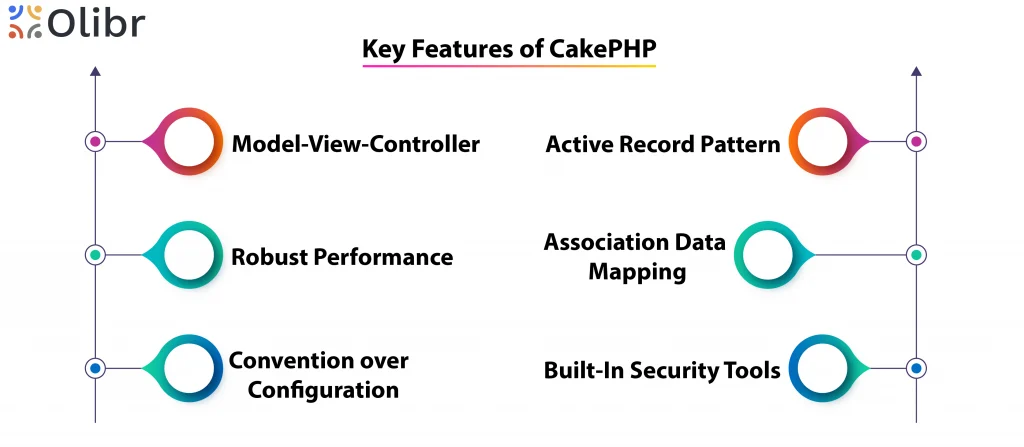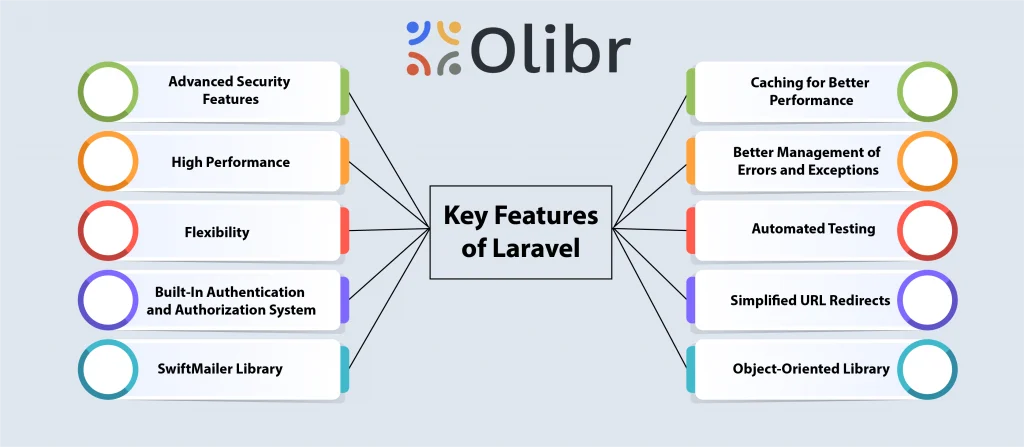Table of Contents
ToggleIntroduction
PHP is one of the most used programming languages. Almost 34 million existing websites currently use PHP. The scripting language is known for its ability to build dynamic and interactive web applications. PHP web frameworks like CakePHP and Laravel offer distinctive features that help developers build structured web applications. The two frameworks have been the favorites of developers across the globe. There are 707,893 websites using Laravel and 179,981 CakePHP customers across the globe. But is Laravel better than CakePHP? What distinguishes CakePHP and Laravel? What is CakePHP used for? Where can you use Laravel? Read on to learn more.
PHP: An Overview
PHP (Hypertext Preprocessor) is a scripting language widely used for web development. Web Technology Surveys reports that more than 75% of websites use PHP in 2023. Despite being an almost three-decade–old framework, PHP is extensively used even today as it offers optimal project solutions. PHP code is executed on the server, i.e., it can be embedded into HTML. PHP development is focused on server-side scripting, and it can be integrated with different databases such as Oracle, Microsoft SQL Server, MySQL, PostgreSQL, Sybase, and Informix. CakePHP and Laravel are PHP frameworks that offer built-in features that make the software development process efficient.
Read More: Top PHP Frameworks in 2023
What is CakePHP?
CakePHP is an open-source, rapid development PHP framework. It was released 18 years ago in April 2005, and the latest release as of October 2023 is CakePHP 5.0.1. The framework is a foundational structure for programmers to create web applications faster, with minimal coding. It helps in the rapid development and maintenance of web applications built in PHP. CakePHP’s robust MVC architecture streamlines the process of building applications with code generation and scaffolding. Developers using CakePHP are known to show better productivity, as its conventions reduce configuration. CakePHP is an excellent choice for projects that need efficient and structured coding, and emphasizes on rapid development without sacrificing flexibility.

Don't miss out on your chance to work with the best!
Apply for top job opportunities today!
What is Laravel?
Laravel is also an open-source PHP framework developed by Taylor Otwell in 2011. It allows developers to write flexible codes and create anything from small websites to full-scale enterprise applications. According to Google Trends, Laravel is one of the few PHP Frameworks that has seen increased use in the last five years.
Just like CakePHP, Laravel also offers pre-built packages and features, which help developers build feature-rich sites and applications. Laravel is known for its elegant syntax and its ability to simplify complex tasks like routing, caching, and authentication. Laravel’s features help developers write clean, maintainable code for modern web application development.
Why use CakePHP?
Key Features of CakePHP

There are many reasons why developers choose CakePHP for building websites. Here are some features that make it a great choice for the web development process.
Model-View-Controller: The HMVC (Hierarchical-Model-View-Controller) architecture of CakePHP simplifies coding for developers, making it one of the most user-friendly PHP frameworks available. The software design patterns in MVC help them create maintainable, modular, rapidly developed applications for clients. Application tasks separated into models, views, and controllers can help build lightweight applications. Cake PHP MVC framework supports rapid and parallel development, which makes it easier to separate logic from the presentation. This feature is especially useful when working on large applications and sites.
Robust Performance: The advanced tools offered by CakePHP facilitate optimized performance. It allows developers to build websites in a variety of programming languages. CakePHP also offers flexible data validation process. It has many validation rules, some of which are built in.
Convention over Configuration: This feature allows software frameworks to make the development process easy by allowing developers to be involved only in crucial decisions. The structure allows flexibility and also decreases the discrepancy between modules or components.
Active Record Pattern: A web development process based on a modern framework employs ORM to convert data between incompatible type systems using OOP languages. Active Record Pattern is a common ORM. Its basic concept is that it keeps your database records active in your system. It helps you compose elegant queries that are easy to understand and maintain.
Association Data Mapping: It is another ORM, and it allows more flexibility between domain and database. CakePHP takes ideas and concepts from both the ORMs to build an implementation that is a flexible combination of both Active Record and Data Mapper patterns.
Built-In Security Tools: The CakePHP codebase is audited through the Mozilla Secure Open-Source program. CakePHP has built-in tools for input validation, CSRF protection, form tampering protection and SQL injection prevention.
Why Use Laravel?
Key Features of Laravel

Advanced Security Features: The Bcrypt hashing algorithm used by Laravel implies that passwords are never stored in the database. This solves the most important issue for most companies – security threats. Laravel also helps fix security vulnerabilities and technical issues before deployment. Security problems such as cross-site scripting, query spoofing, and SQL injection can be easily managed with Laravel. The advanced security features of Laravel also help with faster debugging and correction of security and technical issues.
High Performance: A growing business will always invite heavy traffic to websites. This makes it essential that web development frameworks are capable of handling requests with agility. Laravel’s message queuing system allows you to delay some website tasks. For example, sending emails at a later date. The ease of handling tasks reduces the possibility of a 500-server error and can also reduce hosting costs.
Flexibility: The built-in libraries in Laravel allow developers to create a range of applications—from a complete e-commerce site to a simple B2B site — without the clients having to spend too much money. Laravel also allows the creation and maintenance of a variety of advanced features for a site regardless of complexity or size.
Built-In Authentication and Authorization System: Laravel’s plug-and-play user authentication system makes it easier to assign access rights. The built-in authentication packages allow for controlled access to protected resources, process requested access requests easily, and reject unauthorized requests.
SwiftMailer Library: This is a mail integration function that simplifies mail API configuration for individual accounts. Laravel also supports sending emails and notifications through multiple channels. For example, you can send emails via SMS and Slack. In addition, one can also provide cloud-based email services such as SMTP, Mandrill, and Amazon SES with drivers.
Caching for Better Performance: The server-side caching with built-in drivers helps with better memory management automatically. Further, Laravel has appropriate commands to increase the cache limit. This lets your application load faster and also offers better backend performance.
Better Management of Errors and Exceptions: Laravel’s integrated logging library Monolog makes it easier to manage errors in order forms, feedback forms, call order forms, etc. The convenient built-in error and exception handling module allows quick and efficient rectification of errors. As a result, it leads to increased customer satisfaction because of improved delivery of information to end users in real time.
Automated Testing: The built-in testing features allow developers to see how the solution performs without any glitches or errors. In addition, the PHPUnit testing support makes it simpler for developers to test fundamental user behavior and analyze results efficiently.
Simplified URL Redirects: Laravel built-in file configuration makes it easier to define and identify URL routes. This means there are less chances of an empty URL redirect, more user interactivity, enhances user experience, and speeded development.
Object-oriented Library: The vast pre-populated object-oriented libraries supported by Laravel simplifies the implementation of security, encryption, password resets, and CSRF operations. As a result, one doesn’t have to waste time building object-oriented models. Also, it allows faster synchronization of databases between development engines and hassle-free database migration.
Laravel vs CakePHP: Which one is better?
CakePHP vs Laravel: Speed
CakePHP: One might also have to work around to improve its speed, for example, by optimizing images. However, compared to Laravel, CakePHP is faster.
Laravel: It is not known to be the fastest framework but offers ways to improve speed. For example, caching queries, routes, and configuration can help improve the speed.
CakePHP vs Laravel: Scalability
CakePHP: It also offers HMVC architecture to build scalable and customized projects. However, users seem to think that CakePHP is better at handling smaller projects.
Laravel: The MVC architecture makes it possible to build enterprise-level applications and ecommerce sites. It offers a variety of scalable features, such customization and multi-language use.
CakePHP vs Laravel: Performance
CakePHP: Swift tests conducted to evaluate its performance indicate that CakePHP is better than Laravel as it does not offer data binding.
Laravel: Laravel offers great speech even when it is combined with bigger projects. However, you might have to get help from the Laravel community for tips on how to improve performance.
CakePHP vs. Laravel at a Glance
| CakePHP | Laravel |
|---|---|
| Open source, uses HMVC architecture | Open source, built on MVC architecture |
| Secure framework | Also a secure framework |
| Database oriented document model | Object oriented model |
| Can use small data sets | Cannot use small data sets |
| No data binding | Two-way data binding |
| Templates using Underscore | Templates through HTML attributes |
| Great community support | Also offers great community support |
The Bottomline
CakePHP and Laravel come with their list of benefits. As a developer or a business owner, you need to take into account your needs and goals. Smaller projects would benefit from CakePHP as it is faster and offers more security. On the other hand, bigger projects would do well on Laravel, as it offers better features and capabilities.
Take control of your career and land your dream job!
Sign up and start applying to the best opportunities!

FAQs
Yes. CakePHP is a free, open-source, rapid PHP development framework.
You can use GoogleHost to host Laravel for free.
Smaller projects with fewer complexities can benefit the most from CakePHP.
Yes, if you want to build larger projects. CakePHP is a better option for smaller projects.


